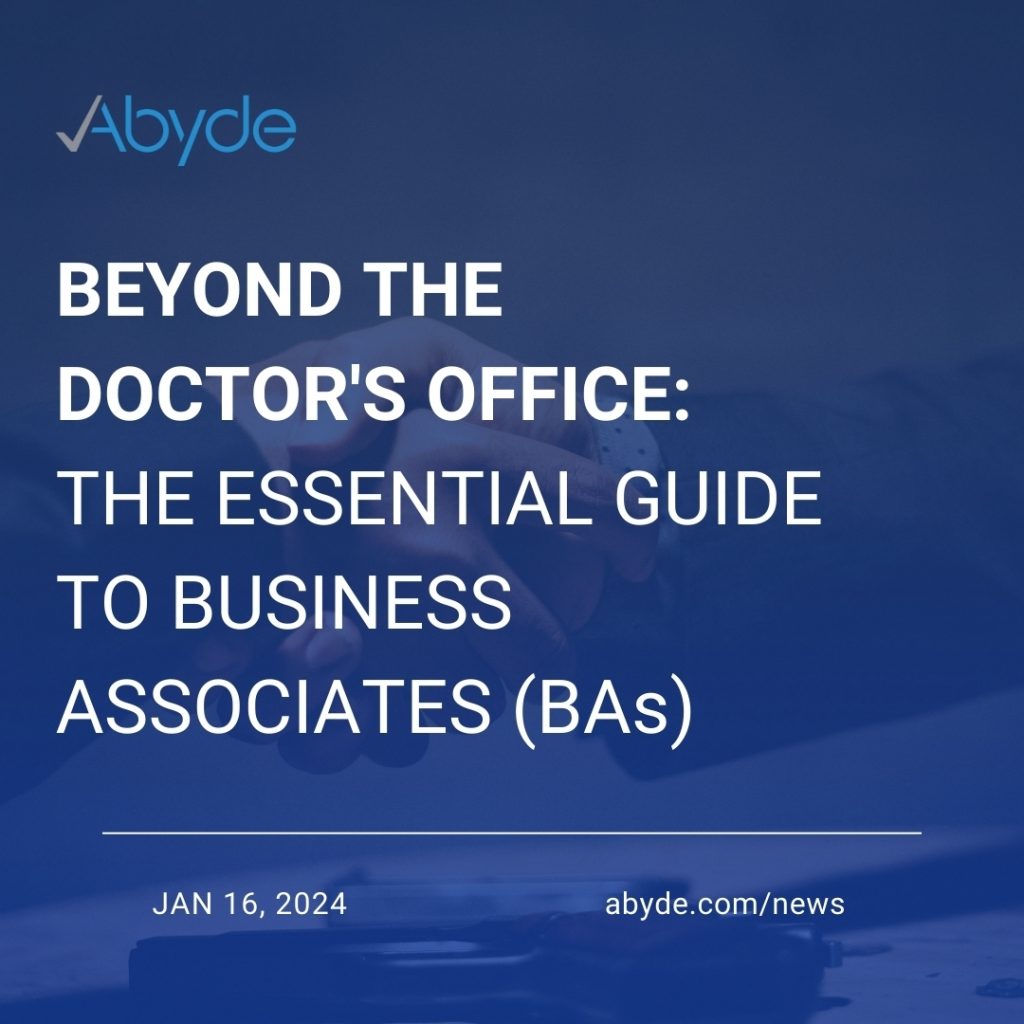February 12, 2024 The medical field is undergoing a digital revolution, and IT companies are more than just the folks building all the fancy gadgets. They’re putting on virtual white coats and becoming Business Associates (BAs), working hand-in-hand with healthcare providers. But this isn’t just about cool tech – it’s about protecting something crucial: your health information. So, what exactly do BAs do? The Health Insurance Portability and Accountability Act (HIPAA) defines BAs as any person or entity that creates, receives, transmits, or maintains protected health information (PHI) on behalf of a covered entity, such as a hospital or health insurance provider. This means IT companies involved in tasks like: Responsibilities and Actions: Becoming a BA comes with a significant responsibility to comply with HIPAA regulations. Here’s what IT companies, as BAs, must do: Beyond Compliance: Building Trust and Value: While compliance is paramount, IT companies can go beyond the minimum requirements and truly become valuable partners in healthcare. Here are some ways: The Future of IT in Healthcare: The future of healthcare is digital, and IT BAs are the key to keeping it safe and secure. By embracing their responsibilities and working together, they can ensure that technology not only revolutionizes healthcare, but also protects what matters most – the health and safety of patients. To learn more about our IT partners, click here. To learn more about how to keep your IT organization compliant, email info@abyde.com and schedule a compliance consultation here.
The Consequences of Neglecting Shared Responsibility: A Business Associate Case Study
February 9, 2024 The world of healthcare data is complex, with numerous players responsible for safeguarding sensitive patient information. While doctors and hospitals are at the forefront, Business Associates (BAs) also play a critical role in HIPAA compliance. From marketing firms to IT organizations, any entity handling protected health information (PHI) for a Covered Entity (CE) becomes a BA, entrusted with a dual mission: serving clients and ensuring data security. Abyde has written a case study on the consequences of Business Associates neglecting their shared responsibility. The case of Doctors’ Management Services (DMS) serves as a stark reminder of the consequences of avoiding BA responsibilities. In April 2017, a ransomware attack compromised the PHI of over 200,000 patients, putting them at risk. Shockingly, DMS discovered the breach over a year later, failing to implement basic security measures and promptly report the incident. This resulted in a $100,000 fine – the first-ever HIPAA penalty related to ransomware – and three years of corrective action under OCR monitoring. The key takeaways are clear: Here’s how Abyde can help BAs navigate HIPAA compliance with ease: We have a new software launching soon focused on assisting Business Associates achieve HIPAA compliance. Our software is revolutionizing, and it: Don’t wait to become the next cautionary tale. Choosing Abyde’s HIPAA for BA software demonstrates your commitment to compliance excellence. Read the entire case study here. For more information on how your organization can achieve compliance, email info@abyde.com and schedule an educational consultation here.
BA Blunders: Lessons From Major Fines Given to BAs
February 6, 2024 Hey there, privacy protectors! Abyde here, your friendly neighborhood compliance champion, dropping some serious knowledge about Business Associate (BA) blunders. You know, those slip-ups that land you in hot water with HIPAA? Not a fun time at all. Here are some major lessons that BAs can learn from to ensure they continue to uphold their shared responsibility of protecting patient data. Proactive security is key: Assuming your company is immune to threats can lead to costly mistakes. Doctors’ Management Services faced this harsh lesson when they were part of a cyber attack and their files, which included protected health information, were infected with ransomware. DMS didn’t realize their files were affected for over a year. This infection isn’t something that can be quickly cured, with hacking organizations demanding money in exchange for access to files. The DMS’s delayed reactionary response teaches BAs what not to do. The DMS did not have an updated security risk assessment, policies and procedures in place, or security systems in place to be prepared for this ransomware attack. The OCR fined them a pretty penny, $100,000, for their negligence. This lesson was also the first fine based on a ransomware attack. Secure all servers: All protected health information, or PHI, a Business Associate interacts with, needs to be properly secure. While this seems obvious, BAs have learned this lesson the tough way, like MedEvolve’s $350,000 fine. MedEvolve had PHI online on an easily accessible server. This publicly accessible server included information like patient names, billing addresses, and even social security numbers. A similar fine also occurred to iHealth Solutions, an IT organization that did not properly secure access to a server that contained the PHI of over 250 patients. This mistake cost the company $75,000. Set up remote deletion of PHI: When working in a business, numerous devices have access to PHI. It is imperative to ensure data can be quickly wiped if these devices get into the wrong hands. A perfect example of this lesson was one learned by the Catholic Health Care Services of the Archdiocese of Philadelphia, which was fined $650,000. There was a theft of a CHCS employee’s phone that contained PHI. This phone had access to extensive PHI, including, social security numbers, diagnoses and treatments and patients’ families. Due to this stolen device, and no proactive measures to mitigate the detrimental impacts of theft, the CHCS was heavily fined and had to be monitored for two years. These fines may grab headlines, but the true cost goes beyond money. Breaches erode patient trust, damage reputations, and hinder the security of healthcare. Remember, BAs play a vital role in safeguarding sensitive information, and non-compliance has far-reaching consequences. While these fines serve as expensive lessons, Abyde is here to simplify compliance for your organization. Learn more about what it means to be a compliant Business Associate by emailing info@abyde.com and scheduling an educational consultation here.
Your Role in Protecting Patient Data
January 22, 2024 In the intricate healthcare ecosystem, patient data flows through a network of entities, each holding a piece of the puzzle. At the core are covered entities, like hospitals, clinics, and health plans, directly responsible for patient care and managing their Protected Health Information (PHI). Alongside them stand business associates, vendors and service providers who handle PHI on their behalf, performing crucial tasks like billing, claims processing, and data analytics. Both covered entities and business associates share a critical responsibility: safeguarding patient data with utmost vigilance. Breaches or misuse of this sensitive information can have severe consequences, eroding trust, damaging reputations, and potentially harming patients. So what exactly constitutes your role in this collective effort, depending on your position within the system? Unpacking the Roles: Sharing the Responsibility: Some vital roles Covered Entities and Business Associates play in data security include: Shared Accountability, Shared Success: Protecting patient data is a team effort. Covered entities and business associates must work together, hand-in-hand, to build a robust security ecosystem. This requires: Compliance is not just a box to tick; it’s a shared commitment to safeguard patient trust and privacy. By understanding their roles and responsibilities, both covered entities and business associates can lead as protectors of patients’ sensitive information. For more information on how you can ensure compliance, contact us at info@abyde.com and schedule an educational consultation here.
Beyond the Doctor’s Office: The Essential Guide to Business Associates (BAs)
January 16, 2024 In the healthcare world, data privacy reigns supreme. That’s where the Health Insurance Portability and Accountability Act (HIPAA) comes in, safeguarding sensitive patient information known as protected health information (PHI). But HIPAA’s reach extends beyond hospitals and doctors’ offices. Enter the business associate (BA): a vital player in the healthcare ecosystem, yet often shrouded in mystery. So, who exactly are BAs? Imagine a bustling healthcare landscape. Hospitals outsource billing services to companies, pharmacies rely on data analytics firms, and insurers partner with cloud storage providers. All these entities, if handling PHI, become BAs under HIPAA. In simpler terms, a BA is any person or organization that performs certain functions or activities involving PHI on behalf of a covered entity (healthcare providers, health plans, and clearinghouses). BAs sometimes are field-specific, like optometrists having eyeglass labs and OCT manufacturers. Dentists also have BAs like dental labs and equipment providers. Think of BAs as the supporting cast in the HIPAA play. They handle crucial tasks behind the scenes, ensuring smooth healthcare operations while keeping patient data secure. But with great responsibility comes great accountability. BAs are bound by the same HIPAA regulations as covered entities, meaning they must: Why are BAs important? BAs play a critical role in the healthcare industry’s efficiency and innovation. They allow covered entities to focus on patient care while outsourcing non-core activities. But more importantly, BAs contribute to a robust system of PHI protection, ensuring patient privacy and trust. The BA landscape is constantly evolving. With the rise of telehealth and cloud computing, new types of BAs are emerging. This highlights the need for ongoing education and awareness about BA responsibilities to maintain robust HIPAA compliance across the healthcare spectrum. Remember: Whether you’re a seasoned healthcare professional or a curious outsider, understanding BAs is crucial for navigating the complex world of HIPAA. By demystifying their role and responsibilities, we can work together to build a stronger, more secure healthcare system for everyone. So next time you hear the term “BA”, remember: they’re not just business associates; they’re essential allies in safeguarding patient privacy and ensuring a healthy future for HIPAA compliance. If you have any other questions on business associates, email us at info@abyde.com, or set up an educational consultation with one of our compliance experts.
Firewall Fireworks: iHealth Solutions Wrapped in $75,000 Worth of Red, White, and Blue Compliance Flags
June 28, 2023 The U.S. Department of Health and Human Services Office for Civil Rights (OCR) has decided to celebrate the 4th of July a bit differently this year. No, they’re not hosting a BBQ or a picnic. Instead, they’ve resolved a blazing inquiry with iHealth Solutions, a Kentucky-based firm providing a whole array of IT services to healthcare providers, including coding, billing, and onsite IT support. Like leaving the fireworks out in the rain before the big show, iHealth Solutions committed a significant faux pas by allowing the protected health information of 267 people to be as unguarded as a picnic basket at a bear convention. “HIPAA business associates must protect the privacy and security of the health information they are entrusted with by HIPAA-covered entities,” said OCR Director Melanie Fontes Rainer. “Effective cybersecurity includes ensuring that electronic protected health information is secure, and not accessible to just anyone with an internet connection.” In 2017, the sparklers were lit when a report emerged stating that iHealth Solutions had experienced an unauthorized transfer of protected health information from its unsecured server. This information wasn’t just your average email addresses and phone numbers – the information included confidential information, including patient names, birth dates, Social Security numbers, diagnoses, treatment information, and medical histories. The investigation detected a potential failure on iHealth Solution’s part to adequately assess risks and vulnerabilities to electronically protected health information across the organization. So, what’s the big *BANG* at the end of this fuse? A pretty hefty $75,000 civil monetary penalty, paid to OCR by iHealth Solutions. The company also agreed to a corrective action plan which includes several measures to ensure the protection of electronic protected health information. These steps include conducting a thorough analysis to identify risks and vulnerabilities, implementing a risk management plan, evaluating changes that affect the security of information, and revising HIPAA policies and procedures as required. As a finale, iHealth will be under the watchful eye of OCR for two years, ensuring its compliance with the HIPAA Security Rule. Abyde helps organizations avoid catastrophes precisely like this one. Abyde is like the super-organized neighbor who prepares for the 4th of July celebrations months in advance, ensuring everyone’s safety and enjoyment. They’re not in the business of barbecues and fireworks but rather in making HIPAA compliance as smooth and worry-free as a classic American apple pie. So, as we celebrate our independence this July 4, let’s remember that freedom should never come at the expense of our security, especially when it involves our personal health information. Here’s hoping your barbecues are hot, your fireworks are safe, and your servers are secure!
Outsourced Doesn’t Mean Overlooked
January 26, 2023 We get it. The hiring market is tough out there right now and when your main goal is providing the best experience for your patients, you will do whatever it takes to build a strong team. But before you go sailing the high seas to find your next hire, you might want to make sure they’re paddling in the same direction. Are you considering outsourcing job roles to agencies that employ individuals in other countries? A company’s location and where its employees are located doesn’t necessarily mean they are or are not HIPAA compliant. As a practice, you are responsible for checking the company’s policies and procedures of any company you hire to ensure that they comply with all relevant regulations. If an organization outsources any function that involves access to PHI, it must have a written contract with the Business Associate. Here are some questions we recommend asking prior to working with an outsourced company: Let’s make sure all eyes are on the same prize – HIPAA compliance. Still not sure if you’re asking the right questions? Give us a buzz and we will walk you through the most important processes and policies to follow.
When & Why You Need a Business Associate Agreement
April 20, 2021 We’ve all heard the saying ‘sharing is caring’ but sometimes doing a good deed could actually steer you into some consequences later down the road. Let’s say, for example, you just loaned your car to your best bud whose “quick trip to the store” actually consisted of running red lights and racking up parking tickets. Though you might not have been the one in the driver’s seat – your name will be the one on all of the lovely fines that wind up in your mailbox, not your BFF’s. Now you’re probably wondering where we’re going with all of this. And while cars and protected health information (PHI) might not have a whole lot in common, it goes to show how certain situations in life require additional precautions to minimize the risk of being responsible for another’s wrongful actions. This idea rings especially true when it comes to working with and sharing something as valuable as sensitive health information. HIPAA law provides a pretty specific roadmap for how your practice should be safeguarding PHI and outlines certain standards that if not met – could result in a hefty fine. But with all the government requirements, advancements in technology, and changing patient needs – it’s impossible today to run a practice without the help of third-party vendors. So whether it be an outside medical billing company, IT support, or document shredding company – any vendor that comes into contact with PHI is a business associate (BA) of your practice and requires their own set of directions for proper handling. Just as covered entities have obligations under HIPAA law, so do business associates – with one of the most important being a documented and signed Business Associate Agreement (BAA). A BAA is essentially a written agreement between your organization and the business associate, specifying each party’s responsibilities when accessing and maintaining PHI and it offsets the liability so that your practice can take a backseat if any incidents were to occur. As you probably wouldn’t hand over your keys to just anyone without laying down some ground rules first, the same goes for providing access to patients’ sensitive health information. Like most contracts, the terms and conditions in a proper BAA can be pretty lengthy and may vary based on the type of vendor you’re working with – but here are some of the basic HIPAA requirements that should be outlined: Permitted uses and disclosures of PHI Specific safeguards that the BA is expected to establish Breach Notification requirements Policies and procedures for providing PHI access at your practice’s or patient’s request Business Associate Training requirements Guidelines for how PHI should be returned or destroyed upon termination of the BAA Meeting all the requirements for what should be included in a BAA is just the first stretch of the drive, and something we’re often asked is, “What if one of my vendors refuses to sign?” Given the fact that having a signed BAA with all vendors you work with is a HIPAA requirement, it’s probably a good idea to put the brakes on any working relationship with a vendor who can’t agree to your terms and conditions. Just last year a medical practice found itself a victim of a HIPAA hit and run after filing a breach report stating that their EHR company was blocking access to the practices’ ePHI in exchange for $50,000 to be paid by the practice. While it might seem pretty obvious that the business associate was the driving force of the incident, because there was no BAA in place – the $100,000 in damage fell solely on the provider. A Business Associate Agreement not only lays out the rules of the road for how PHI should be handled but holds the BA directly liable for any non-compliance that happens when they’re behind the wheel. Having a proper agreement in place with each and every vendor you work with ensures that they’re best protecting your patients’ PHI and means that your practice can steer clear of the hefty HIPAA fines if they don’t.
OCR Drops Another HIPAA Fine, Business Associate Exposes 6 Million Records
September 23, 2020 The Office for Civil Rights has been dropping fines left and right in the last week, releasing their 7th (and largest) HIPAA settlement earlier today and bringing their running total to seven fines in just 8 days. The latest violation came with a hefty payout of $2.3 million as well as an extensive 2-year corrective action plan – and not to mention a whole lot of apology letters to write. The lucky winner of the latest HIPAA settlement is CHSPSC LLC, a business associate who serves a number of hospitals and clinics owned by Community Health Systems, Inc out of Tennessee. You may be thinking, “well no biggie, I’m a covered entity not a business associate so that wouldn’t be me,” but the 6 million+ patients affected and the reasons the OCR gave for levying a fine would beg to differ. Just like any covered entity might be, this business associate was the victim of a cyberattack that even after alarms were raised went unmitigated for months. As if that wasn’t enough, the OCR investigation discovered long standing non-compliance with the HIPAA Security Rule ultimately landing the business associate at the top of the most expensive 2020 fines list. On April 10, 2014, CHSPSC’s information system was infiltrated by a threat group that went unnoticed until the company was notified by the FBI 8 days later. The hackers continued to have a field-day, accessing the sensitive data for 4 months after the initial attack. CHSPSC’s continued disregard for implementing the necessary security protections required by HIPAA even AFTER receiving federal notice was described by OCR Director, Roger Severino, as “inexcusable”. The cyberattack affected 237 different covered entities served by CHSPSC and withdrew the PHI of 6,121,158 individuals including everything from names and birthdays to emergency contact information and social security numbers. As if over 6 million patients records being taken wasn’t bad enough, an OCR investigation into the business associate found several gaps in their compliance program including: It doesn’t matter whether you’re a healthcare provider, business associate, or just the average joe – falling victim to a cyberattack is fair game. Because business associates require the same HIPAA safeguard requirements as covered entities, no matter who gets hacked the OCR is looking for the same requirements and can hand out the same fines for either type of health related entity. For providers especially, entrusting your patients sensitive data to your business associates comes with added risks. In this case, 237 covered entities had to find that out the hard way. While there’s no way to be 100% in the clear from things like cyber attacks, having the proper business associate agreements in place at least takes the liability of an incident off your practice’s hands. If you had been one of those 237 entities affected here, lack of an agreement could have put your practice on the same chopping block as CHSPSC.
Who Qualifies as a Business Associate?
May 8, 2020 As a business owner, you know there are a lot of elements that go into running a successful healthcare practice. It’s common to have third-party companies assist with everything from accounting, to document disposal, to managing remote operations through cloud sharing and telehealth services. These vendors may be a big part of keeping your practice running smoothly. While you may already do a fantastic job of checking your contracts with these vendors – your terms of service, payments, etc. – where many practices fall short is in reviewing your vendor’s obligations to protect your sensitive patient information. As a healthcare provider, your practice functions as a covered entity, and any vendor that comes into contact with PHI in the process of working with your practice becomes a Business Associate (BA). Not all companies that your practice hires come into contact with PHI, so how do you know who exactly qualifies as a Business Associate? The HHS defines a Business Associate as any organization that creates, receives, maintains, or transmits PHI on behalf of a covered entity. Some examples of Business Associates include: Once you determine who is considered a Business Associate to your practice, you must then institute formal agreements to ensure your practice and your third-party vendors are properly protecting the security of your patient information. This agreement highlights the specific elements of HIPAA compliance that should be followed by both you and each of your Business Associates, including: Even if a vendor comes into contact with your PHI only once, it’s better to play it safe and have the proper agreements in place – just that one instance could be the catalyst for a breach of PHI. Not having the proper Business Associate agreements in place has been the cause of hundreds of HIPAA violations. One case, in particular, cost a medical practice in Utah a $100,000 settlement on top of a two-year corrective action plan. The practice filed a complaint against their EHR company who allegedly had been blocking access to patients’ ePHI. Although it might seem like the practice was a victim in this situation, the OCR found that there was no Business Associate Agreement in place – leaving the liability solely on the practice’s shoulders. Data breaches, cyber-attacks, and improper handling of PHI can happen to your practice at any time as well as the companies you work with – especially when operating remotely or bringing on new vendors to help manage operations. Ensuring that you have the proper agreements in place is vital in not only protecting your patient data but offsetting the liability of your practice in the case of a breach. A software solution like Abyde makes this process a whole lot easier with a Business Associate Portal that automatically generates formal agreements with all the proper policies and procedures in place – taking the stress of HIPAA compliance off you and your vendors.









